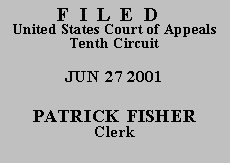

|
UNITED STATES OF AMERICA, |
|
Before HENRY, BRISCOE, and MURPHY, Circuit Judges.
The case is before this court on Rosheldon Negil Jenkins' request for a certificate of appealability ("COA"). Jenkins seeks a COA so he can appeal the district court's denial of his motion to vacate, set aside, or correct sentence brought pursuant to 28 U.S.C. § 2255. See 28 U.S.C. § 2253(c)(1)(B) (providing that the appeal of a final order disposing of a § 2255 petition may not be taken to a court of appeals unless a COA is issued). Because Jenkins has not made "a substantial showing of the denial of a constitutional right," this court denies Jenkins' request for a COA and dismisses the appeal. See id. § 2253(c)(2).
Jenkins pleaded guilty to one count of distribution of crack cocaine in violation of 21 U.S.C. § 841(a)(1). A motion was brought by the government pursuant to U.S.S.G. § 5K1.1 and the district court departed downward from the applicable sentencing guidelines range. The court sentenced Jenkins to 120 months' incarceration and four years' supervised release. This court dismissed Jenkins' direct appeal for lack of jurisdiction. See United States v. Jenkins, No. 99-6340, 2000 WL 1064768 (10th Cir. 2000) (unpublished disposition).
Jenkins next filed the instant § 2255 habeas petition. In his petition, Jenkins raised three claims: (1) his guilty plea was not made voluntarily; (2) his counsel was ineffective for failing to subject the government's case to a meaningful adverse testing process; and (3) the government failed to produce any evidence that the substance in question was crack cocaine. Jenkins had not raised any of these claims in his direct appeal.
The district court determined that the issues Jenkins could have raised on direct appeal were procedurally barred unless Jenkins could show cause and prejudice for the default.(1) See Coleman v. Thompson, 501 U.S. 722, 750 (1991). Recognizing that Jenkins' ineffective assistance claim could constitute cause for the procedural default, the district court considered the merits of that claim. See United States v. Cox, 83 F.3d 336, 341 (10th Cir. 1996) ("A defendant may establish cause for procedural default by showing he received ineffective assistance of counsel."). The district court determined that Jenkins could not show either constitutionally-deficient performance on the part of his counsel or that he was prejudiced by counsel's performance. See Strickland v. Washington, 466 U.S. 668, 687 (1984). The district court, thus, entered judgment denying Jenkins' § 2255 petition. Jenkins then sought and was denied a COA.(2) In this appeal, Jenkins raises the same three issues he raised before the district court.
Jenkins is not entitled to a COA unless he can make "a substantial showing of the denial of a constitutional right." 28 U .S.C. § 2253(c)(2). Jenkins can make that showing by demonstrating that: (1) the issues raised are debatable among jurists, (2) a court could resolve the issues differently, or (3) that the questions presented deserve further proceedings. See Slack v. McDaniel, 529 U.S. 473, 483-84 (2000).
This court has reviewed Jenkins' request for a COA, Jenkins' appellate brief, the district court's order, and the entire record before us. In his application for COA and opening brief, Jenkins has not identified any error in the district court's analysis and we can find none. Thus, our review demonstrates that the district court's disposition of Jenkins' § 2255 petition is not deserving of further proceedings, debatable among jurists of reason, or subject to different resolution on appeal. Accordingly, Jenkins has failed to make the required substantial showing of the denial of a constitutional right and is not entitled to a COA. See 28 U.S.C. § 2253(c)(1)(B). This court denies Jenkins' request for a COA for substantially those reasons set forth in the district court's order dated January 19, 2001, and dismisses this appeal.
SUBMITTED FOR THE COURT
Michael R. Murphy
Circuit Judge
*. This order and judgment is not binding precedent, except under the doctrines of law of the case, res judicata and collateral estoppel. The court generally disfavors the citation of orders and judgments; nevertheless, an order and judgment may be cited under the terms and conditions of 10th Cir. R. 36.3.
1.The district court specifically noted that the relief sought by Jenkins is resentencing, not the vacation of his guilty plea. Thus, nothing in the record supports the argument that a fundamental miscarriage of justice would result if Jenkins' claims were not considered. "The fundamental miscarriage of justice exception is available only where the prisoner supplements his constitutional claim with a colorable showing of factual innocence." Herrera v. Collins, 506 U.S. 390, 404 (1993) (quotation omitted).
2.The district court also denied Jenkins' motion to proceed in forma pauperis on appeal. Jenkins renewed that motion before this court. Jenkins' renewed motion to proceed in forma pauperis on appeal is denied.